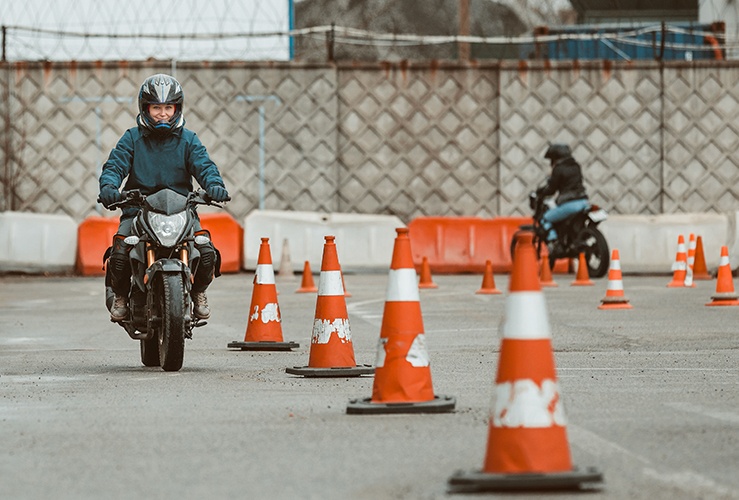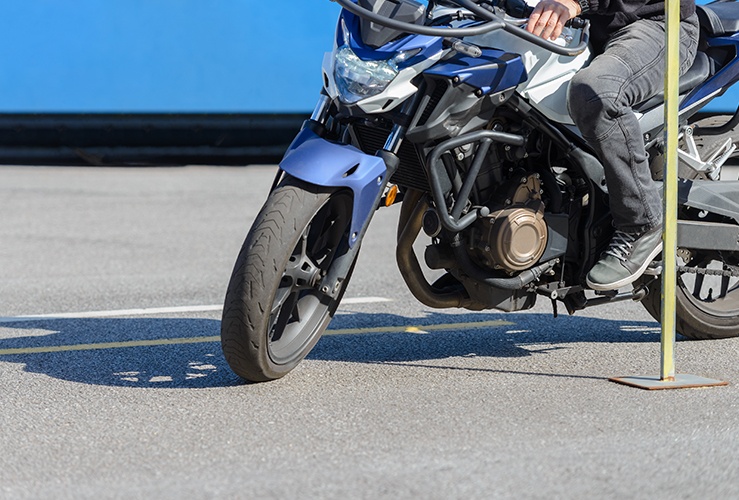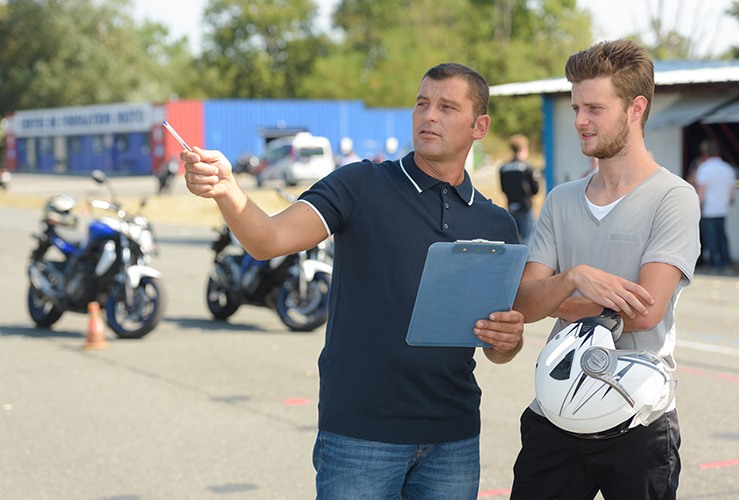Learn how taking an advanced motorcycle course could make you a safer rider, reducing the risk of injury - and even save you money on your annual insurance.
Constant vigilance and care are required in order to ride a motorcycle safely, particularly since the risk of injury or death to you is higher on a two-wheeled vehicle.
Without safety features such as roll cages and airbags, even a minor collision could lead to broken bones.
Between 2014 and 2020, motorcycle injuries and fatalities fell in the UK, but rose again between 2020 and 2022 - underlining the ongoing risks associated with being a motorcyclist.
How extra training can help
As with so many things in life, the more training and skills you have - in this case behind the handlebars - the better you'll be able to deal with hazards when they arise. With additional training you’ll be better prepared for the risky behaviour of other drivers and riders, the unpredictable actions of pedestrians and animals, bad weather, or substandard road surfaces.
Taking an advanced motorcycle riding course can give you the skills required to meet these challenges, and give you the best chance of staying upright and avoiding injury - or even death.
Benefits of taking an advanced rider training course:
- Improved overall road safety
- Enhanced hazard perception skills
- More confidence and peace of mind on the road
- Lower insurance premiums
The three main UK advanced rider qualifications
In the UK, there are three main organisations offering advanced motorcycle rider courses, each offering their own qualifications.
The Institute of Advanced Motorists (IAM)
The Institute of Advanced Motorists (IAM) chiefly operates the Road Smart scheme. Its advanced course costs £175 at the time of writing (19/3/24).
This scheme gives you membership to a local IAM motorcycle group, and between 6 and 12 sessions with an Observer - a volunteer who is an Advanced Rider, and who holds an additional Institute of the Motor Industry qualification.
The course is based on the ‘IPSGA’ framework (Information, Position, Speed, Gear, Acceleration), and when your Observer believes you are ready, you'll take the Advanced Test. If you pass, you'll be awarded ‘Advanced Rider’ and ‘IAM RoadSmart Member’ status.
Royal Society for the Prevention of Accidents (RoSPA)
The Royal Society for the Prevention of Accidents (RoSPA) is another charity which offers a number of advanced rider courses, including:
- RoSPA Advanced Motorcycle Test - a flexible, modular training program designed for the needs of business riders.
- RoSPA Level 2 Award in Advanced Riding - a four-day course that helps riders achieve an advanced level of skill and reduce the risk of an accident on the road.
- RoSPA Advanced Drivers & Riders (RoADAR) - a road safety-focused course open to general members of the public.
- Advanced Motorcycle Training - a four-day training course covering the theoretical and practical aspects of "deliberate, responsible and admirable riding".
- RoSPA Level 3 Award in Advanced Motorcycle Instructor Training - a five-day course to help riders deliver effective training to qualified motorcyclists.
There are around 60 groups offering RoSPA training for motorcyclists. There's an hourly fee for training, then an £85 fee for the test, when you're ready.
DVSA Enhanced Rider Scheme (ERS)
The Driver and Vehicle Standards Agency (DVSA) enhanced rider scheme (ERS) helps you become a safer rider while developing your motorcycling skills. These courses are offered by DVSA enhanced rider scheme trainers across the UK. A number of additional modules - such as effective braking techniques - can also be taken.
Aside from helping you become a safer rider and reduce the risk of injury to you and other road users, you'll get a ‘DVSA certificate of competence’ when you pass - which can be used to get a discount on your insurance (offered by most UK providers).
This advanced motorcycle training course is suitable for those who've just passed their test and want to enhance their skills, as well as those returning to riding after a break.
It may also be useful if you're upgrading to a more powerful motorcycle, or simply if you want to check your standard of riding.
The course features seven core modules:
- structured planned approach to riding
- defensive riding and hazard awareness
- progress and use of speed
- overtaking and filtering
- bends and corners
- slow control
- developing the correct rider attitude
After the training period, you'll take an assessment which lasts 1-2 hours.
The theory test costs £66, while the registration and renewal fee is £90 per year (£240 for four years).
How your skills are assessed
Whichever course you choose, your instructor is likely to use a one-way intercom system so they can talk to you and provide guidance and safety tips while riding. At some point, they may also provide real-time commentary, as they react to what they see you do on the road - invariably an enlightening experience!
How long will it take?
IAM and RoSPA courses tend to be more flexible, with no set times; they're more like a friend taking you out on the road and giving you tips.
The ERS, however, is usually set to a half or full day.
Do I need my own bike?
With the ERS course, you may be able to borrow a bike for a fee, but with IAM and RoSPA, you would use your own two wheels. The machine you learn on doesn't have to be a superbike; using a low-power motorcycle is just as useful for learning how to make your rides safer.
So is it worth taking an advanced rider training course?
The answer to this question is a resounding Yes. No matter what your skill level, taking one of the UK’s advanced motorcycle courses will help you better identify on-the-road hazards and help you avoid collisions and associated injuries.
Instructors are generally very patient, and you'll likely thoroughly enjoy the time you spend training.
Any hints and tips you pick up will help you become a safer rider - and will therefore be worth every penny spent. Better still, gaining an extra riding qualification may result in paying a lower insurance premium - so the cost could be offset over time.
More ways to improve your motorcycling
If you're not drawn to further tuition, or if cost is an issue, you might consider investing in reading material designed to help riders improve their skills.
One such publication is ‘Roadcraft’, which forms the basis of RoSPA and ERS tuition. This is considered 'the bible for advanced riders’ and is issued to riding experts and police motorcyclists, as well as other emergency service personnel.
The book 'How to be a better rider' is based on similar principles and is used by IAM.







